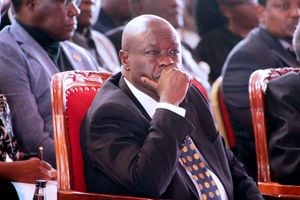
Tusker players celebrate with the title after winning the 2020-21 FKF-PL on August 22, 2021 at Utalii grounds.
| Jeff Angote | Nation Media GroupOther Sports
Premium
Tusker at 100 years: A Kenyan story of distinction
What you need to know:
- Beer brand has been the king of sports sponsorship in the region - boxing, football, rugby, darts et al, bringing fame and fortune to athletes and smiles to a whole nation
- The story touches millions of people. It is a story worth telling. And as KBL Managing Director, John Musunga, said: “The history of Tusker is inextricably intertwined with that of Kenya as a nation. Its centenary milestone is testament to the resilience and grit of the Kenyan people, and a confirmation of the limitless possibilities we can achieve if we work together for a common goal – as encapsulated in Tusker’s “Pamoja Milele” philosophy.”
I have a life-long acquaintance with the sporting activities of Kenya Breweries, which periodically thrusts upon us the names of its products, or group companies, depending on the corporate objectives they want to achieve.
These days it is all about Tusker. But when they ran the most robust corporate sports sponsorship programme in Africa in the 1970s and early 80s, they were Kenya Breweries. Sometimes they are even East African Breweries. They have a bewildering number of products but across 100 years, Tusker has been their flagship.

Tusker players celebrate after they won the FKF-PL title at Utalii grounds on August 22, 2021.
To a Kenyan of any age on the street, Breweries is Tusker and Tusker is Breweries.
I am re-looking at their Golden Jubilee booklet as I write this. Its cover reads: “Kenya Breweries 50 Jubilee. Fifty Years of Kenya Breweries.”
It is a 1973 booklet, in remarkably good shape. I am enjoying the read because I remember those times very well. It was around that time that their future Nairobi Area Sales Manager, Avtar Singh Sohal, was packing up his sticks after entering the Guinness Book of Records as the player with the highest number of appearances for his national hockey team in the world: 167. Avtar, our most capped Olympian, took part in the Olympics of 1960, 1964, 1968 and 1972.

Tusker players celebrate with the title after winning the 2020-21 FKF-PL on August 22, 2021 at Utalii grounds.
It was also at that time that the young light-flyweight, Stephen Muchoki was preparing to take the amateur boxing world by storm. He was raised in the tough Muthurwa neighbourhood of Nairobi and bloomed as an employee and fighter for Kenya Breweries.
In 1974, he would become our sole gold medallist at the Commonwealth Games in Christchurch, New Zealand.
It was Brian Tetley, the masterful wordsmith of blessed memory who once ran a wistful column by the title “A great future behind me.” (Tetley was killed in the hijacked Ethiopian Airlines jetliner that crashed off the Comoros in 1996. He loved his Tusker and before burying him, his friends put two bottles inside his coffin to, as they said, ‘quench his thirst in his journey yonder.’)
But a great future behind them indeed must be the lot of those who lived the life of Ruaraka, home of Tusker – or Kenya Breweries, or East African Breweries, whichever you like – in the 1970s and 80s.
And no one says it better than Ellie Adero, the winning captain of Harambee Stars in Cecafa 1983, and one of the most celebrated wingers to ever don a national shirt in our history. My research for my book “Kick-Off: the Game, the Glory and the Greats of Kenyan Football,” led me to him.
How was life at Tusker Village in your day, I asked him. His eyes shone and his face, still handsome despite the gathering years, broke into a smile. But it was the kind of smile that tells you not so much about happiness but longing.
Ellie said: “It was the best life anyone could ask for. The entire company breathed sport and those of us who played at the highest level enjoyed all the support we needed. The management fell over themselves to make us happy. Sometimes I don’t believe that all that came to an end.”

Tusker players celebrate after they won the FKF-PL title at Utalii grounds on August 22, 2021.
Adero was first among equals if you made a line-up of the sporting ambassadors of Tusker Village. Not only was he one of the longest serving Tusker players but he was also a 10-year veteran of Harambee Stars.
He was the Tusker coach who fell at the last hurdle in the 1994 Africa Cup Winners Cup campaign, today called the CAF Confederations Cup.
Tusker at 100 is where we are now. 1922-2022. Tusker at 100 gives us an opportunity to remember and reflect and to cast an eye into the future. For a corporate giant with footprints all over our commercial and social life, Tusker at 100 is as a momentous an anniversary as they come.
Anniversaries are an important part of our personal, social, organizational and national life and people have marked them throughout human history and will continue to do so. Anniversaries are the milestones of our human existence which comprises the past, the present and the future.
Anniversaries play a key role in this continuum. Why do we mark them? Here are a few of my observations.
We human beings are by creation social beings who in pursuit of life’s necessities are often forced to lead individualistic lives. Anniversaries restore us to our natural habitat, however transiently.
Anniversaries give us pause in life’s journey and afford us a chance to reflect and remember, to be self-critical if need be, to renew ourselves, and to peer into the hopefully bright future. All these are important elements of the multi-dimensional character of human life.
Some philosophers have posited that the entire purpose of life in this world is to pursue happiness. If that is so, anniversaries give us a chance to put doom and gloom aside to just feel good about being ourselves.
Anniversaries help us understand who we are. We learn lessons from our past while being careful not to be hostage to it.
And finally, the absence of anniversaries means a soulless, meaningless existence without any definable ends, beginnings and interfaces which is antithetical to healthy human life.
100th anniversary party
So, let the 100th anniversary party of Tusker begin. We are ready to partake. But first, for we sports lovers, it is important to allow Brian Tetley’s question to haunt us: is a great future behind us?

Tusker coach Robert Matano (left) and skipper Eugene Asike lift the FKF-PL title at Utalii grounds on August 22, 2021.
I return to the Golden Jubilee booklet, published in 1973 at the end of the anniversary year, and quote from it just to help you determine the answer to this question. It seems to bear out Ellie Adero with every coma and full stop.
Tusker FC was then about one year old. This was the report: “In the sporting field, the Tusker football team has produced great performances winning the 1971/72 Madaraka Cups, sharing the latter with the Prisons department; in 1971/72 they won the Guinness Cup and Nairobi Football League Cup."
“Boxing is the second most successful sport. In 1971, Tusker boxers won the Gilfillan Trophy. Other sports include netball, darts and tennis. In field sports, those interested welcomed the completion of the new sports pavilion, the first of its kind in Kenya. In June of 1972, the Brewery held a sports festival to aid the Olympic entrants and raised well over 1,000 pounds which was handed to the Kenya Olympic Association.”

Tusker goalkeeper Emery Mvuyekure celebrates with the FKF-PL title after they won it at Utalii grounds on August 22, 2021.
Now the benefits to the employee-sportsmen and women who made all that happen: “They enjoy a compassionate loan scheme which is free of interest. Those who complete 12 years of service are awarded a certificate gift of 12 ordinary shares. If the employee remains with the company for 21 years he receives a gold watch with his name and service details engraved upon it.
“At Ruaraka Village, brewery staff are housed in modern stone-built flats or houses and enjoy village life. There will be schools and shops. Cinema shows and other entertainment is provided by the company. Children of company workers are able to obtain scholarships to enable them to study at technical and secondary education levels. Students who have shown special promise and who otherwise would not be able to afford a higher education are given financial assistance. It is hoped that some who receive these scholarships will later return and join the company.”
Tell that to professional Kenyan footballers today who go for months on end without salaries and who are forever playing hide and seek games with irate landlords. Not Tusker’s players, though. Since day one in 1970, they have been a privileged lot.
On January 24, 1973, Tusker celebrated its Golden Jubilee by opening a new Headquarters Building for East African and Kenya Breweries. The function was presided over by Vice President Daniel arap Moi.
That launched celebrations at all Kenya Breweries installations and depots throughout the country. And before the year ended, the company played up its pre-eminent role in Kenya’s economic and social life.
At that time, the country was 10 years old and much was made of the first decade of independence. Ten Great Years was the national catchphrase. Tusker angled for a place – deserved, one must say – at the high table.
Founding President Jomo Kenyatta was leading the celebrations and the hard driving Breweries Managing Director, Kenneth Matiba, a sports fanatic if ever somebody was born one, made sure the spotlight never left Ruaraka. Matiba and Tusker is a full story by itself.
When the company wrote that “the history of Kenya Breweries is very much the stuff of the history of Kenya,” they weren’t making a false claim. It is. Beyond sport, its imprint on our life is huge. Market dynamics forces it to change focus every now and then but it has remained an economic and social powerhouse all the time.
With the close of the first 50 years of the company’s existence, its leadership felt that the chapter of the history of brewing in Kenya had come to a close. “But,” they said, “half the story remains untold…the facts therein are unknown. It cannot be recorded of all who benefit throughout the cobweb of commerce, industry and agriculture that makes up the warp and weft of the brewing industry.
“But it can be said with justification that every man, woman and child in the new civility gains some part of the good living provided from the taxation paid directly by the industry; tax contributed by employees; by those who manufacture ancillary products, the farmers, the distributors, shopkeepers, hotels and bars.
“We mention taxation. But we must not forget that great though the effect of taxation be, there is a parallel. It comes with the words “Cheers”, or “Good luck”, or “Gallons of joy” when the bottle is poured and Kenyans look at one another with a smile, raise their glasses in the old gesture of content.”
In 1986, I was at Ruaraka to write about the exponential growth of the Tusker sports programme. At that time, only the armed services – KDF, Kenya Police and Kenya Prisons, produced more international sports stars than Breweries – and for straightforward reasons.
The company was in a class of its own among the corporates. Across the year, there was a Festival of one sport or the other - Festival of Golf, Festival of Darts, Festival of Horse Racing, Festival of Fishing.
The 1978 wall calendar was themed Salute to Sports. Its pictures were breathtaking.
Somehow, Matiba had moulded the company into his own image and put together a team absolutely committed to sporting prowess.
Muthoni Muthiga and Muthui Kariuki drove the golf agenda. Marsden Madoka was the long serving chairman of the Amateur Boxing Association of Kenya. Chris Obure was a former Harambee Stars player. Sammy Lui was the committed personal assistant to Matiba who executed public relations perfectly.

Tusker FC players celebrate after they were crowned FKF-PL champions at Utalii grounds on August 22, 2021.
Brian Hobson, later Managing Director and chairman played tennis and bridge long into his dotage, still enjoying his cigar.
Tusker at 100 is an epic Kenyan story. It touches millions of people. It is a story worth telling. And as KBL Managing Director, John Musunga, said: “The history of Tusker is inextricably intertwined with that of Kenya as a nation. Its centenary milestone is testament to the resilience and grit of the Kenyan people, and a confirmation of the limitless possibilities we can achieve if we work together for a common goal – as encapsulated in Tusker’s “Pamoja Milele” philosophy.”
I couldn’t agree more.




